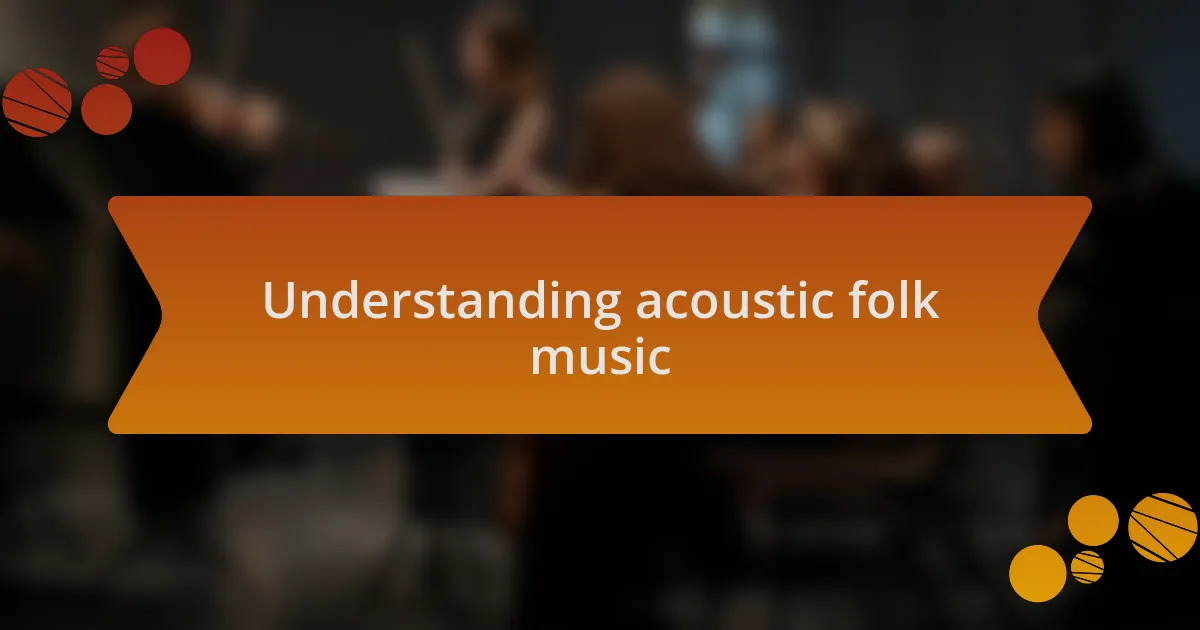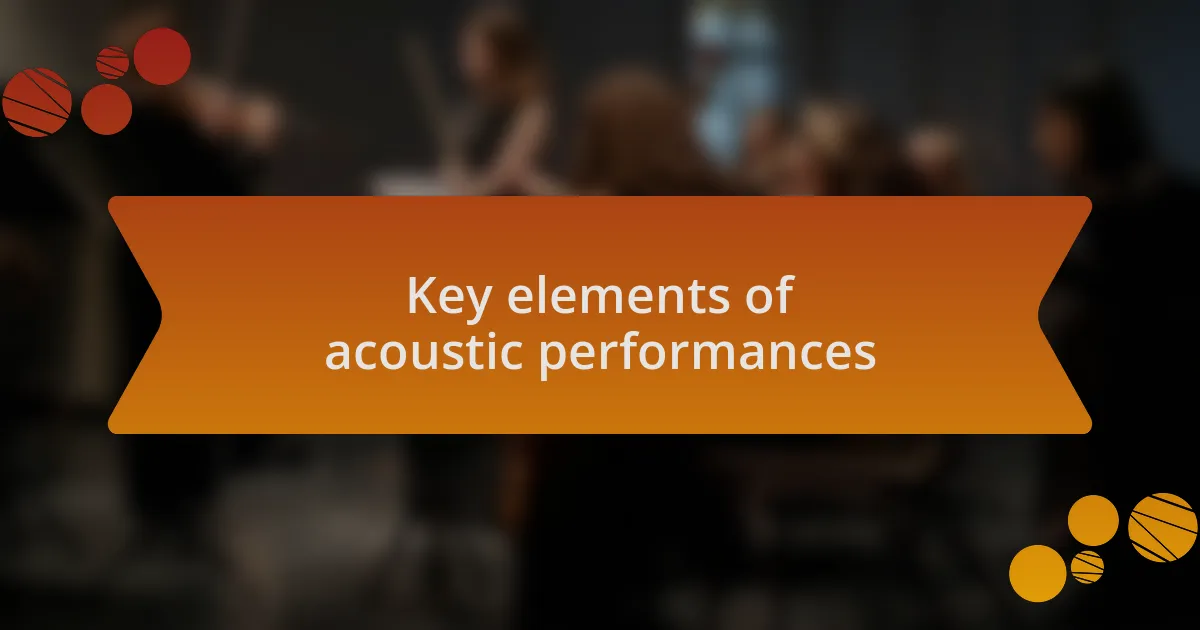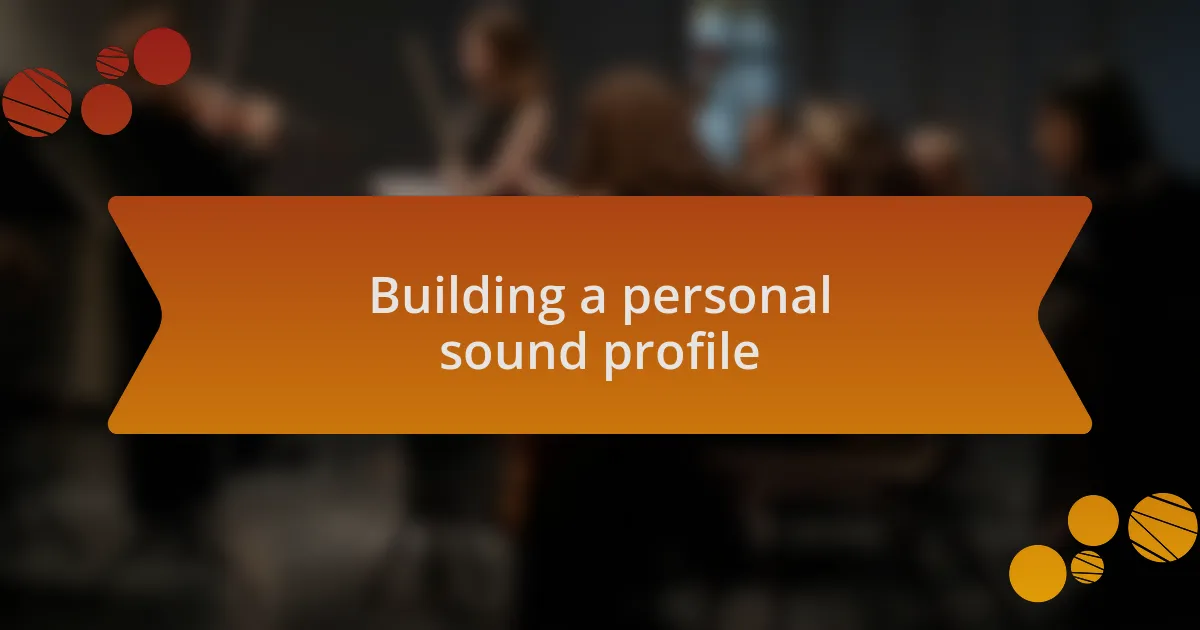Key takeaways:
- Acoustic folk music emphasizes storytelling and emotional connection, resonating with personal experiences of listeners.
- Intimate music venues enhance the live performance experience, fostering a strong connection between artists and audiences.
- The authenticity of acoustic performances, characterized by stripped-down instrumentation, allows for deep emotional engagement.
- Building a personal sound profile involves identifying preferred music styles, instruments, and lyrical themes that resonate with individual experiences.

Understanding acoustic folk music
Acoustic folk music, at its core, is a celebration of storytelling and simplicity. I remember the first time I heard a live acoustic set at a small venue; the warmth of the wooden guitar and the rawness of the vocalist’s voice drew me in completely. There’s something profoundly intimate about hearing a musician strip away the layers of production to share a personal story through their art.
The genre connects deeply with emotions, often capturing life’s joys and sorrows in poignant lyrics that resonate with listeners. Have you ever found yourself lost in the melody of a folk song, reflecting on your own experiences? I have, and it often feels like the artist is speaking directly to me, weaving my own life’s narrative into their music. That connection is what makes acoustic folk so compelling.
Beyond just sound, acoustic folk music thrives in its community aspect. I’ve attended many gatherings where friends share original songs or covers, creating a space where everyone feels included. Isn’t it magical how music can foster connections and evoke feelings in a shared moment? The essence of acoustic folk lies in its ability to unite people around shared stories and emotional experiences.

Importance of music venues
Music venues play a crucial role in the acoustic folk scene; they are the heartbeat of the community where artists and fans connect. I remember attending a small venue where the walls were adorned with local art and the air was thick with anticipation. It struck me how these intimate spaces allow performers to communicate directly with their audience, creating an environment charged with emotion and creativity.
Moreover, the atmosphere of a music venue can elevate the experience of a live performance. I’ve often felt that the closeness of the stage makes each note resonate more deeply, almost like the artist is singing just for me. Can you recall the last time you felt that profound connection? It isn’t just about listening to music; it’s about feeling every lyric, every strum, and sharing those moments with fellow enthusiasts.
Lastly, these venues serve as incubators for talent, nurturing emerging artists in ways that larger stages cannot. I’ve witnessed newcomers evolve into remarkable performers simply by having the opportunity to share their music in a supportive setting. It’s empowering to see your favorite local act grow, knowing you played a part by being in the crowd during their early shows. What could be more inspiring than watching passion flourish in real time?

Key elements of acoustic performances
The essence of acoustic performances lies in their authenticity. When I watch an artist play an acoustic set, I often notice how the stripped-down instrumentation allows their voice and lyrics to shine. There’s something incredibly powerful about just a guitar and a voice—it feels raw and honest. Ever felt that chill run down your spine when the first chord strikes? It’s moments like these that remind us of music’s ability to touch our hearts.
Another key element is the dynamic between the performer and the audience. During one unforgettable show, the artist paused to share a personal story before playing a song—the room felt electric. It wasn’t just a concert; it became a shared experience where everyone felt included. This connection fosters a community atmosphere, making each performance not just about the music, but about shared emotions and stories. Isn’t it magical when a performance transforms into a conversation?
Lastly, the setting plays a crucial role in shaping the acoustic experience. I remember a cozy venue with warm lighting that created an inviting backdrop for the musicians. The ambiance can amplify the emotional journey of each song. Have you ever noticed how certain spaces seem to cradle music? It’s like they breathe life into the performance, making every note more poignant. Each element, from lighting to layout, contributes to the overall experience, enhancing our connection to the music.

Building a personal sound profile
Building a personal sound profile is all about knowing what resonates with you. I remember attending a small open mic night where different artists brought their unique styles, from soft fingerpicking to more upbeat strumming. It made me reflect on my preferences; the more intimate performances drew me in, while louder sets left me feeling overwhelmed. Have you ever felt that disconnect during a show? It’s crucial to identify what moves you, as this shapes your own listening and concert experiences.
You also want to consider the types of instruments that captivate you. For example, I’ve always felt drawn to the soothing sound of a well-tuned banjo. The first time I heard it in a folk ensemble, something inside me shifted. It’s incredible how particular instruments can evoke memories or emotions. Have you pinpointed what instruments stir something within you? Understanding your musical preferences enriches your experience, helping you seek out performances that align with your sound profile.
Lastly, don’t forget about lyrical content and songwriting styles. There’s a specific type of storytelling in folk music that resonates deeply with me. I once connected with a song that painted a vivid picture of a rainy day, capturing emotions I had felt on similar days myself. When you identify the themes and stories that touch your heart, you’re not just building a sound profile—you’re crafting a personal connection to the music. How often do we find solace in lyrics that mirror our own experiences? Embracing this aspect can deepen your appreciation for acoustic music, making each performance feel personal and meaningful.